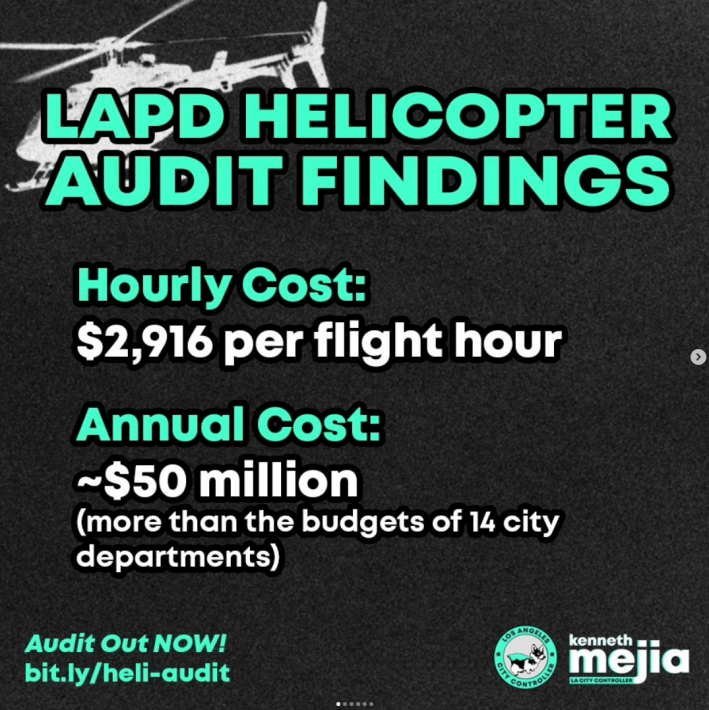If you live in the city of Los Angeles, there’s a good chance that you’ve been awoken from a deep slumber by the incessant sound of an LAPD helicopter hovering above your bed. Helicopters, or “ghetto birds” as they’re sometimes called, have become a fixture of L.A. life, particularly for the city’s communities of color.
For years, Angelenos have asked questions about the LAPD’s infamous helicopter program and its effectiveness in deterring or stopping crimes. But they haven’t received many answers, until now.
On Monday, the Los Angeles City Controller's Office released its highly anticipated audit of the LAPD’s Air Support Division (ASD), after facing criticism from supporters who accused the newly elected progressive city controller of not living up to his campaign promise of holding LAPD accountable.
LAPD helicopters spend most of their time responding to non-high-priority incidents, that include shuttling passengers to an ASD sponsored annual chili luncheon and flying-by a golf tournament, according to the new audit.
Between the years 2018 and 2022, more than 60 percent of LAPD helicopter flight time was dedicated to “transportation flights, general patrol time, and ceremonial flights.” Versus just under 40 percent of flight time dedicated to felony crimes, such as murders or missing persons cases.
LAPD helicopters were used for more than 700 “fly-bys” at “LAPD events like academy graduations, retirement ceremonies, and police station events as well as community events and golf tournaments.”
The LAPD’s helicopter fleet, known as the Air Support Division (ASD), is the largest municipal airborne law enforcement operation in the country and comes at a taxpayer cost of nearly $50 million annually.
The controller’s audit, which took “the better part of a year,” is the first audit of the program since it was launched with a single helicopter in 1956.
Today, LAPD’s Air Support Division boasts more than 15 choppers.
The controller’s report found that LAPD’s Air Support Division is costly and has negative impacts on the environment and local communities.

LAPD helicopters burn through more than 760,000 gallons of gasoline each year, according to the audit. By comparison, a car would have to be driven for more than 19 million miles to burn that much fuel.
The controller’s report also found that LAPD helicopters spend a disproportionate amount of time in certain communities, like Northeast L.A. and South L.A., doing patrols and responding to crime.
The LAPD’s Pacific Area experiences the fewest number of LAPD helicopter flights, relative to Part 1 crimes, which include robbery, grand auto theft and murder.
“Difference between the presence of police helicopters and reported crimes may indicate an outsized presence of helicopters over certain communities and underrepresented presence in other communities,” the audit says. “This can increase the risk that police helicopters, and any associated negative impacts, are disproportionately impacting certain communities. Alternatively, communities where ASD helicopter operations are less common may be receiving fewer resources to assist with apprehensions.”
In response to a request for comment, LAPD Chief Michel Moore told L.A. TACO:
“We received the final report today and will review it closely. I believe the Air Support Division’s activities play a critical role in our public safety mission here in Los Angeles. Their flights frequently result in their arrival at calls for service ahead of our patrols aiding responding officers with critical information and situational awareness. Air support also provides added patrols to detect and prevent crimes, including residential burglaries, while also responding to officer’s assistance calls involving violent and highly dangerous situations.”
A spokesperson for Los Angeles Mayor Karen Bass did not respond to text messages sent Monday morning.
During a Monday morning press conference, Sergio Perez, the Los Angeles City Controller’s Chief of Accountability, stressed that a team of auditors who worked under the previous administration were responsible for the audit and that it was not politically motivated.
“I want to stress to you that our auditors… they’re the ones that carried out this work without political direction,” explained Perez. “This is truth, this is objective, you can trust it.”
Perez highlighted gaps in LAPD data and alluded to the friction that existed between the two city agencies during the audit process. The LAPD was not a “good faith partner” during the audit, Perez told members of the media, including dozens of people watching the press conference on Instagram Live, which resulted in delays and unnecessary expenditures, he claimed.
Perez said that the controller’s office had to buy several years of flight data from a third-party vendor because the LAPD apparently does not maintain such records themselves.
Dinah Manning, the city controller’s Director of Public safety, said she grew up in South Central and that helicopters were part of her “daily experience.”
During Monday’s press conference, Manning unveiled a new map that will eventually become public, and allows users to see flight paths for specific days and neighborhoods.
Manning encouraged all Angelenos to read the controller’s audit and ask, “What are you getting out of this investment?”
You can check out the full report here.






